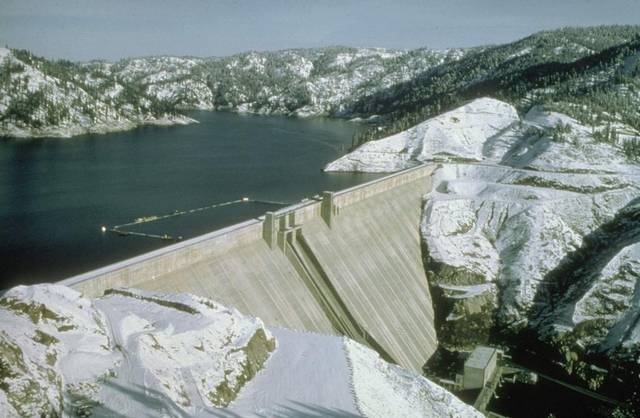forum
library
tutorial
contact

Rehab of Dworshak's Unit 3
Has its Share of Hiccups
by Elizabeth Morgan
Clearwater Tribune, August 16, 2017
|
the film forum library tutorial contact |

|
Rehab of Dworshak's Unit 3
by Elizabeth Morgan
|
 John Chatfield, Operations and Maintenance Manager for Dworshak Dam, spoke at the last Orofino Chamber of Commerce meeting held Aug. 2.
John Chatfield, Operations and Maintenance Manager for Dworshak Dam, spoke at the last Orofino Chamber of Commerce meeting held Aug. 2.
Much of the conversation this spring and summer has involved the closing of Dworshak's Unit 3 for repair work and the impacts of that closure. Unit 3 is operated routinely in the spring for flood risk reduction, and in the summer for flow and temperature augmentation to aid in juvenile and adult fish migrations.
The unit was built in 1970 and put online in 1973, which makes it over 40 years old.
At full load (250 MW), Unit 3 is the largest of Dworshak's three turbines, and passes between 5,200 cfs and 6,400 cfs, which is over 55% of the powerhouse capacity.
In August 2014, Unit 3 tripped off-line due to a ground fault on the Phase C winding. "We took it apart in house with our own crews and repaired it at Dworshak," said Chatfield, "The unit remained off-line for 38 days to complete the repairs. Additional testing was performed on the stator core and it was determined that the core was at the end of its service life, substantially increasing the concern for its reliability.
Bonneville Power Administration awarded Andritz Hydro a $10.1M contract for the work. Disassembly of the generator started Sept. 28, 2016 with an expected return to service date of May 1, 2017.
"This is August," said Chatfield, "and we're not even close."
A few setbacks
Chatfield explained that there have been multiple delays to the schedule for the rehab of Unit 3. They include:
Presently, the new windings are being reproduced in Austria, who is considered to have a little better method of producing them. Impact to fish
The annual Federal Columbia River Power System FCRPS fish passage program will be impacted by the inability to implement the flow augmentation program in the usual manner due to Unit 3 at Dworshak being out of service.
The flow augmentation program will not be able to release a similar amount of cold water without exceeding Total Dissolved Gas (TDG) limits.
This annual water management program generally begins just after July 4, (earlier if needed) to maintain Lower Granite (LWG) tailrace water temperatures at or below 68°F. It uses cold water from DWO reservoir to cool the Snake River to minimize warm water disease in fall chinook juveniles and reduce passage delay for returning adults migrating upstream.
Without the availability of operating Unit 3 in 2017, it may not be possible to release enough cold water from DWR to maintain the LWG tailrace water temperatures at or below 68°F while not exceeding the 110% TDG in the North Fork Clearwater River.
A waiver has been approved by both Idaho Department of Environmental Quality IDEQ and the Nez Perce Tribal Council NPTC (June 27, 2017) to temporarily raise this constraint on DWR outflow to 121% to allow for the cold water.
A fact sheet about Dworshak Reservoir operations is available on the Walla Walla District website at
www.nww.usace.army.mil/Portals/28/docs/dworshak/FS_DworshakReservoir170619.pdf.
learn more on topics covered in the film
see the video
read the script
learn the songs
discussion forum
